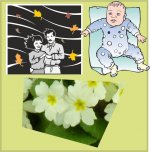English Englyn*??


By Rhiannonw
- 2712 reads
[*pronounced Eng-linn, with the E like in ‘men’ not as in English!]
Storm
Gales blast, gust, buffet, whirling (– angst batters)
bits of clutter swirling,
sights surprise the eyes, winds fling
loose roof-tiles lift, toss, hurling.
__________________________________
New Granddaughter (with her parents)
She gurgles – grins contagious – eyes sparkle;
poke funny face – infectious,
rebounds our sudden sounds to us:
parental play hilarious.
__________________________________
Primroses
Pastel smudges pale emerge – charisma –
March charms in peaceful surge,
elegant on verdant verge:
gentle primrose generous splurge.
Noo suggested using the ‘Risk’ prompt to try a risky form. I have mentioned before being influenced by the complex sound patterns in formal Welsh ‘cynhangedd’ [cung-hann-eth '-hard 'th'] poetry, but haven’t wanted to get involved in trying to get to know and use any of the ‘official’ strict patterns.
The ‘englyn’ traditionally is a very brief, compact verse, and uses ‘cynghanedd’ and set lengths of lines (again though there is variety), there can be a hangover at the end of line 1 linking meaning and consonant/vowel pattern with the beginning of line 2, rhymes sometimes on-beat , sometimes offbeat, sometimes internal.
There can be a danger of concentrating on producing a pleasing (or technically correct) sound-pattern-compostion, but losing a clear message in seeking to fulfil the complexities.
Whether formal cynghanedd would be useable in any form in English, with its different sound composition and ‘music’, I suppose is debatable, but I have attempted to play around with the ideas to try to get what feels somewhat similar in English, and give an impression of this intensive patterened verse – and still convey a point, maybe in an unusual, memorable form.
I worked on these earlier this month, but wanted an opportunity to bounce them off my sister who is a Welsh language academic and who also has enjoyed ‘cynghanedd classes’ for a few years. She liked the idea of adapting the englyn pattern like this to get brief, intense English verse, and while recognising that I had not attempted to master the precise rules of Welsh cynghanedd, something of their effect and impact may be conveyed.
This below is an englyn that my family ‘used’ as a ‘grace’ for giving thanks after meals as I was growing up. You may notice something of the consonant repetition and pattern. In line 2 you may notice the well known Welsh word ‘diolch’ meaning ‘thank-you’.
O Dad yn deulu dedwydd – y deuwn
a diolch o’r newydd,
cans o’th law y daw bob dydd,
ein lliniaeth a’n llawenydd.
- Log in to post comments
Comments
Thankyou so much for posting
Thankyou so much for posting this, Rhiannon. I see what you mean about having to be careful you don't write only for the rules of the composition, but I love the sound of
"rebounds our sudden sounds to us" MAGIC
also "Gales blast, gust, buffet, whirling" has the rhythm of gusty wind.
"March charms in peaceful surge" is beautiful
AND I didn't know Dad came from Welsh for Father.
Do you think there is a similarity between this kind of writing and Haiku?
- Log in to post comments
An interesting verse form.
An interesting verse form. I like the intensity of the three poems - there are some vivid images here. Well done!
- Log in to post comments


